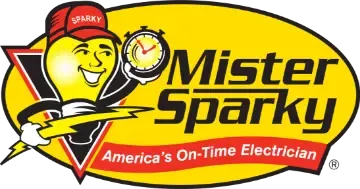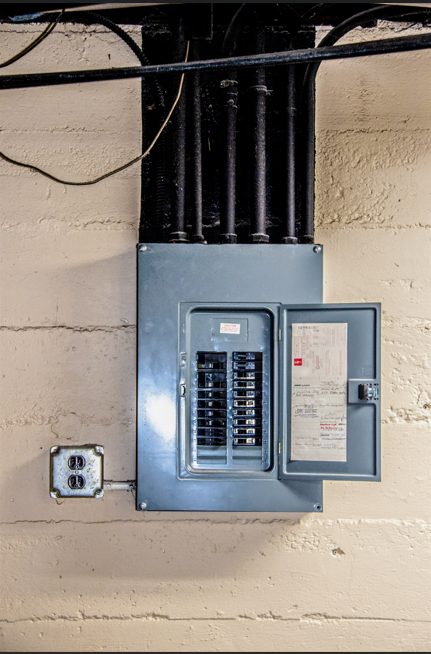You probably don't think about your electrical panel unless something trips or your lights flicker. But that box of breakers plays a big role in your home's safety and day-to-day convenience. If it's outdated or overworked, minor problems can build up fast. At Mister Sparky®, we help homeowners spot warning signs early so they can avoid bigger electrical issues down the line.
Your Breakers Keep Tripping
A circuit breaker is meant to shut off power when the flow gets too high. If your breakers are flipping often, your panel might be telling you it can't keep up. This doesn't always mean something is broken. It might just mean your daily usage has outgrown what the panel was built for. Years ago, homes used fewer appliances. If your panel was installed with that in mind, today's demands can overwhelm it.
You've Got Flickering or Dimming Lights
Lights that dim slightly when a high-powered device kicks on are trying to tell you something. That dip in brightness points to an overloaded panel or loose connection. This gets more frustrating in rooms where you rely on consistent lighting. Kitchens and home offices are commonly affected. Flickering can also indicate bigger electrical problems. Loose wiring behind the panel or aging breakers don't always fail at once. Sometimes, the signs start small. If your lights blink, pulse, or feel unsteady often, that could be a signal that your panel is struggling to regulate power flow the way it used to.
You Still Have a Fuse Box
If your home still runs on a fuse box, you're working with a very outdated system. Fuses serve a similar purpose as breakers, but instead of flipping off, they blow when there's a problem. That means you have to replace them manually. While fuse boxes were the standard decades ago, most homes today use breaker panels for safety and convenience. Modern electrical codes require new circuits to be installed in breaker panels, not fuse boxes. If you're upgrading your system, switching to a breaker panel is necessary to meet code. If you plan to upgrade your wiring or circuits, you will absolutely need to switch from a fuse box to a breaker panel.
Something Smells Near the Panel
If you catch a burnt or smoky odor coming from your panel, something's wrong. This could be melting insulation, scorched wire, or an overheated breaker. In all cases, a large fire risk is involved, so shut off your power and call a licensed electrician. This is an emergency situation, so don't wait. They'll open the panel safely and check what's going on inside. No matter how handy you are, it's not the kind of job you want to attempt yourself.
The Panel Feels Warm to the Touch
Your electrical panel or outlet should never feel hot. This could mean the components inside are struggling to handle the load or that a connection is breaking down. Either way, it's a signal that should not be brushed off. If your panel feels warm even when no big appliances are running, that's more concerning. It's also worth checking for visual signs—discoloration, rust, or visible wear around the breakers can help confirm that something's off. A professional electrician can use thermal tools to test hotspots and check if it's time to replace the unit or just repair a specific area.
System Isn't Keeping Up With Your Home
Upgrades to your home can push your electrical panel beyond its limits. You could add an air fryer, an EV charger or even a few smart home devices. All of those draw current, and each one stacks on top of what your panel is already distributing. You might not notice right away. But over time, your system may start showing signs that it's maxed out. If you've had to juggle which appliances run at the same time, or if you've skipped installing something because you weren't sure the power could handle it, you're not alone. Older panels weren't built for today's level of usage. The fix isn't always complicated, but it does require professional help. An upgrade gives you space to grow and keeps your circuits balanced without risking your safety or burning out the system.
You're Planning a Remodel or Expansion
If you're thinking about finishing a basement, adding a guest suite, or even bumping out a kitchen, your electrical system needs to be part of the planning. That includes the panel. More square footage means more of everything — lights, outlets, and appliances. Even small changes, like adding a dedicated circuit for a treadmill or hot tub, can stretch what your current panel can handle. Remodels typically require a set of permits, including an electrical permit. When changes are made, homeowners are required to bring existing wiring and structure up to code. If you're planning to add new circuits or loads, your existing panel must have the capacity and meet current code requirements. A licensed electrician can review your setup and determine if a new panel is needed or if your current one can be expanded safely. This kind of prep saves time and money later.
You Want to Add Features to Your Panel
Electrical panels can be upgraded to have a whole-home surge protector. This is especially useful if you live in an area with a lot of lightning or power surges. You may also be able to add an outdoor connection point to hook a generator to your panel. Depending on your current panel's capacity, it may be possible to add these features, but often, a panel upgrade offers the safest and most efficient path forward.
Don’t DIY Electrical Panel Work
It can be tempting to look up a how-to video and try fixing a breaker yourself, but that's not a safe idea when you're working with the main panel. This is where live electricity runs through your home, and the risk of electric shock or fire is serious. Even with the main breaker turned off, the service lugs that bring electricity into the panel remain energized. These can only be safely handled by a licensed electrician. Licensed electricians train for this exact kind of work. They bring the right equipment and wear safety gear to handle the job without risk. It's not just about getting the work done correctly, it's about keeping you and your household out of harm's way. If anything from the list above sounds familiar, it's a smart move to bring in a licensed electrician. Catching issues early makes repairs simpler and helps you avoid bigger problems later. Electrical work comes with risks of shock and fire. Because of this, home insurance companies require that electrical work be done by a licensed professional. Many home insurance policies exclude coverage for damage caused by unlicensed electrical work. If a fire or injury results from a DIY wiring job, the claim may be denied.
Help Your Overworked and Overloaded Electrical Panel
An aging or overloaded panel isn’t just inconvenient, it’s a safety risk. At Mister Sparky®, we believe you deserve reliable, steady power that keeps up with your home and your lifestyle. If your system is struggling to keep up, don’t wait for a bigger issue to spark. Contact Mister Sparky® today to explore safe, code-compliant upgrade options, backed by StraightForward Pricing® and our UWIN® Guarantee. We do it right. We do it safely. Every time.















